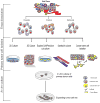Technologies for deriving primary tumor cells for use in personalized cancer therapy
- PMID: 23597659
- PMCID: PMC3665643
- DOI: 10.1016/j.tibtech.2013.03.006
Technologies for deriving primary tumor cells for use in personalized cancer therapy
Abstract
For decades, immortal cancer cell lines have constituted an accessible, easily usable set of biological models to investigate cancer biology and explore the potential efficacy of anticancer drugs. However, numerous studies have suggested that these cell lines poorly represent the diversity, heterogeneity, and drug-resistant tumors occurring in patients. The derivation and short-term culture of primary cells from solid tumors have thus gained significant importance in personalized cancer therapy. This review focuses on our current understanding and the pros and cons of different methods for primary tumor cell culture. Furthermore, various culture matrices such as biomimetic scaffolds and chemically defined media supplemented with essential nutrients, have been prepared for different tissues. These well-characterized primary tumor cells redefine cancer therapies with high translational relevance.
Copyright © 2013 Elsevier Ltd. All rights reserved.
Conflict of interest statement
We declare that none of the authors have a financial interest related to this work.
Figures

References
-
- Zhou BB, et al. Tumour-initiating cells: challenges and opportunities for anticancer drug discovery. Nat Rev Drug Discov. 2009;8(10):806–23. - PubMed
-
- Cancer multidrug resistance. Nat Biotechnol. 2000;18(Suppl):IT18–20. - PubMed
-
- Kirk R. Genetics: Personalized medicine and tumour heterogeneity. Nat Rev Clin Oncol. 2012;9(5):250. - PubMed
Publication types
MeSH terms
Substances
Grants and funding
LinkOut - more resources
Full Text Sources
Other Literature Sources
Miscellaneous

